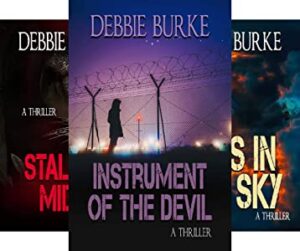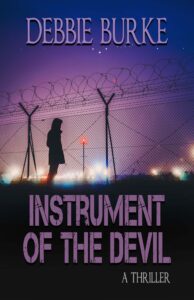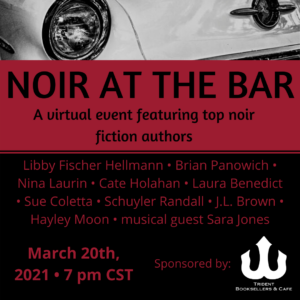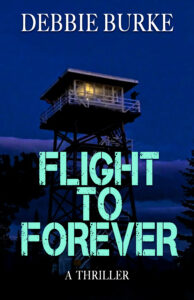
Photo: Wikimedia Commons
By Debbie Burke
Welcome to another Brave Author who submitted a first page for review. Please enjoy reading it then we’ll discuss.
Dinner with a Celebrity
My knees nearly buckled at the sound of the doorbell. Glancing through the window, I saw them waiting on the porch. Fortunately, they were five minutes late. I wished it could have been ten. Accepting that I couldn’t just leave them standing out there, I headed for the door. Even before the door was fully open, a guy hauling a camera brushed past me, mumbling to himself. Another hoisting a microphone boom like a javelin, followed right behind. Without another word they busied themselves setting up.
“Yes. Come right in,” I said, in a tone that may have sounded snarky but was mostly nerves. Without asking, the camera guy moved a chair nearer the window. Would it have killed him to ask? “Can I give you a hand?”
“Just need to get the soft light,” he said. Taking a few steps back he nudged my end table aside and spread out a tri-pod. “This gives the most flattering camera angle.” He was probably responding to my furrowed brow. “Carol will be here in a few minutes.”
“I see,” I had no idea what he meant.
“We have to get everything set up before she arrives. Heaven help us if we don’t capture the Grand Entrance.” He punctuated the statement with an exaggerated eye roll. Grand entrance? I was struck with dread that I might be spending a long evening with a diva.
The very last thing I needed in my life right now was a woman, no matter how innocent the circumstances. I rushed back to the kitchen to check on dinner. What had I been thinking?
The truth is, I hadn’t. Why had I done it? Here’s why? The most pathetic reason on earth—because my friends were doing it.
Honest, I’m old enough to know better. Cold beer may have also been a factor.
That was at least four months ago and I had completely forgotten about it—until yesterday. It all came rushing back to me.
Right there in the bar, we all applied to a reality TV show called “Dinner with a Celebrity”. The show’s premise is simple. A regular person, like me, prepares a dinner. A celebrity, like Carol, comes over to help eat it. There’s a little more to it than that, but not really. I went along only because there was zero chance any of us would be selected. Yesterday, they phoned to tell me I had won and to give me the name of my celebrity.
~~~
First of all, congratulations to the Brave Author for starting this scene with action, conflict, and tension.
GENERAL OVERVIEW: Brave Author doesn’t specify a genre but the light tone and the situation may indicate Romantic Comedy. TKZers, what do you think?
A camera crew barges through the front door of the protagonist’s home and hurriedly sets up equipment in preparation for a vain celebrity diva who’s about to arrive.
Right away, readers share the character’s discomfort. No one likes strangers to intrude in their home, even for a benign reason like a TV reality show. The description of a boom as a javelin is not only accurate but funny.
The backstory set up is handled quickly with a deft, humorous touch, showing the character’s personality and self-doubt:
Why had I done it? Here’s why.? The most pathetic reason on earth—because my friends were doing it.
Honest, I’m old enough to know better. Cold beer may have also been a factor.
Haven’t we all done dumb things because of peer pressure, aided and abetted by alcohol? That makes the character relatable and likable, if a bit goofy.
However, backstory can be further condensed and punched up. See the example shown later.
SPECIFIC SUGGESTIONS:
Name: When writing in first-person POV, the sooner a name is established, the more easily the reader can slide into the story world.
Since the person pushing through the door is mumbling, you might as well use that opportunity to have him say, “Sorry we’re late. You’re Mr./Ms. Doe, right?”
“Yes, but call me John/Jane.”
Gender: I’m unclear if the character is male or female. “The very last thing I needed in my life right now was a woman, no matter how innocent the circumstances.” That implies male but today it could go either way.
Like a name, immediate establishment of gender removes any nagging questions in the reader’s mind.
Maybe I’m being sexist but, to me, the overall tone sounded like a woman trying to write like a man. Would it have killed him to ask? and I rushed back to the kitchen… felt more like the attitude and action of a woman.
The first line could be stronger. “My knees nearly buckled” is not only a cliché but “nearly” weakens it even more. Also, such an intense reaction to a ringing doorbell seems over the top.
Two lines struck me as better possibilities for the opening sentence:
The very last thing I needed in my life right now was a woman, no matter how innocent the circumstances.
Or
Honest, I’m old enough to know better. Cold beer may have also been a factor.
Exaggeration establishes a humorous tone but it felt overdone. I already mentioned knees nearly buckling because of the doorbell. Another example: I was struck with dread that I might be spending a long evening with a diva. Dread is a potent emotion, too strong for the minor inconvenience the character is experiencing.
Secondary characters:
Good job of showing the camera guy as the long-suffering worker who must put up with spoiled, entitled celebrities.
Excellent depiction of Carol’s personality. She hasn’t even appeared on the scene but the reader already knows she a vain PITA (pain in the a$$). If the genre is rom-com, you’ve set up a hate-at-first-sight introduction which immediately promises conflict between the principal characters. Well done.
Tone: the overall feel of the writing is inconsistent. At times, it sounds tentative and uncertain yet other times overstated (e.g. dread). If you’re establishing the character’s personality as an insecure, neurotic, Woody Allen-type, that may be appropriate.
However, if you want a stronger, more positive tone, I suggest you delete some modifiers and sharpen weak sentences.
Here’s a possible revision that assumes the protagonist is male. Also, a little rearrangement for punchier impact:
The very last thing I needed in my life right now was a woman, no matter how innocent the circumstances.
My knees nearly buckled at the sound of the doorbell. Glancing through the window, I saw them crew waiting on the porch. Fortunately, they were five minutes late. Ten would have been better. I wished it could have been ten. Accepting that I couldn’t just leave them standing out there, As much as I wanted to leave them standing there, I headed for the door. Even before it the door was fully open, a guy hauling a camera brushed past me, mumbling, to himself. “Sorry we’re late. You’re Mr. Doe, right?”
“Yes, but call me John.”
Another crew member, hoisting a microphone boom like a javelin, followed right behind the camera man. Without another word, they busied themselves setting up.
“Yes. Come right in,” I said., in a My tone that may have sounded snarky but was mostly nerves. Without asking, t The camera guy moved a chair nearer the window. Would it have killed him to ask permission? It was my house, not a sound set. “Can I give you a hand?”
“Just need to get the soft light,” he said. Taking a few steps back he nudged my end table aside and spread out a tri-pod. “This gives the most flattering camera angle.” He was probably responding to my furrowed brow. “Carol will be here in a few minutes.”
“I see.” I frowned, having no idea what he meant.
“We have to get everything set up before she arrives. Heaven help us if we don’t capture the Grand Entrance.” He punctuated the statement with an exaggerated eye roll. Grand entrance? I was struck with dread that Oh, great. I didn’t look forward to a long evening with a diva.
I hustled to the kitchen to check on dinner in the oven. The very last thing I needed in my life right now was a woman, no matter how innocent the circumstances. I rushed back to the kitchen to check on dinner. What had I been thinking?
The truth is, I hadn’t. Why had I done it? Here’s why? The most pathetic reason on earth—because my friends were doing it.
Honest, I’m old enough to know better. Cold beer may have also been a factor.
That was at least four months ago and I had completely forgotten about it—until yesterday. It all came rushing back to me.
Four months ago, right there in the bar, we all applied to a reality TV show called “Dinner with a Celebrity”. The show’s premise is simple. A regular person [guy], like me, prepares a dinner. A celebrity, like Carol, comes over to help eat it. There’s a little more to it than that, but not really. I went along only because there was zero chance any of us would be selected.
I’d completely forgotten until yesterday when the producer phoned to tell me I had won. My celebrity was Carol XYZ, the hottest dancing sensation to light up TikTok this month. [or whatever Carol’s claim to fame is].
~~~
The writing is clear, competent, and easy to read. The premise is contemporary, intriguing, and funny. Tweaks are small and easily accomplished. This page contains the ingredients for a tasty dinner and shows plenty of promise as an entertaining rom-com.
Brave Author, thanks for submitting.
~~~
TKZers: Would you turn the page? Do you have suggestions for the Brave Author?
~~~
 Looking for a new series to read during long winter nights? Try Tawny Lindholm Thrillers with Passion. The first book, Instrument of the Devil, is FREE.
Looking for a new series to read during long winter nights? Try Tawny Lindholm Thrillers with Passion. The first book, Instrument of the Devil, is FREE.
Amazon Other online booksellers

 My apologies to the brave writer who submitted this first page for critique. I meant to do it sooner, but I’ve had an insanely busy October.
My apologies to the brave writer who submitted this first page for critique. I meant to do it sooner, but I’ve had an insanely busy October.
 Another brave writer submitted their first page for critique. Enjoy! I’ll catch ya on the flip side.
Another brave writer submitted their first page for critique. Enjoy! I’ll catch ya on the flip side.






 Join me, Laura Benedict, and many others on Zoom for Noir at the Bar.
Join me, Laura Benedict, and many others on Zoom for Noir at the Bar. 

